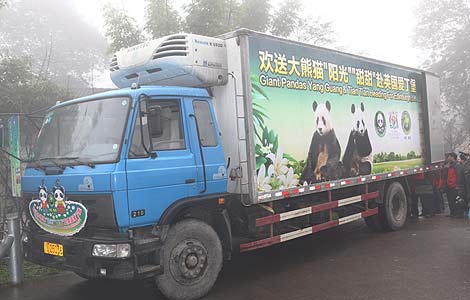A world of difference
Updated: 2011-12-09 08:37
By Ding Qingfen (China Daily)
|
|||||||||
|
A Coca-Cola bottling plant in Beijing. The company plans to invest another $4 billion in China over the next three years. Xinhua |
World benefits
"China's market prosperity has brought huge benefits for other nations," said Pascal Lamy, director-general of the WTO.
In the past 10 years, China annually imported goods worth $750 billion on average, which translated into more than 14 million jobs.
In 2010, the United States exported goods worth $92 billion to China, 4.5 times the amount in 2001. Brazil's exports to China were worth $31 billion in 2010, compared with $2 billion in 2001.
In 2008, China became the largest destination for exports from the least-developed nations, according to the WTO.
Premier Wen said in Guangzhou that "made-in-China goods have helped US consumers save expenditure worth $600 billion in the past 10 years, and each European family spent 300 euros ($420) less every year".
Growth since 2001 is not only about exports and imports. From 2001 to 2010, profits of foreign companies in China increased by 30 percent on an annual basis, and their cumulative profits were $261.7 billion in that period.
"US companies reaped fat profits from China's entry (to WTO), and they now have more access to join the market and grow with it," said Robert Poole, vice-president of the US-China Business Council's China Operations.
"Restrictions on foreign companies have been gradually removed," Long said. "We can see the remarkable contributions made by foreign companies."
Wal-Mart, the world's largest retail chain, had opened 339 supermarkets in 124 Chinese cities by the end of June, creating 95,000 jobs.
Coca-Cola, the world's largest soft-drinks company, announced in August another $4 billion investment in China over the next three years, building upon the $3 billion investment announced in 2009.
Since 1978, absorbing foreign investment has been a national policy for China. "For a long time, foreign businesses have enjoyed many preferential policies, which has helped them grow rapidly," said Sun Weimin, vice-chairman of Suning Appliance Co Ltd, China's leading retailer of household appliances.
Despite the global benefits created by China's economic growth, it has been frequently been challenged and rebuked.
As its exports recorded annual double-digit growth, China has been a major target of trade protectionism.
As a condition to its entry into the WTO, China agreed that its market economy status (MES) would not be recognized internationally until 2016, and this has been a major cause of regular trade remedy cases against China.
From 2001 to 2010, other nations lodged 12 trade remedy cases against Chinese exports, and "trade frictions will continue to rise as China's position as the largest exporter cannot be challenged in the short term", Sun said. "We have to prepare for that."
Next decade
"China will continue to implement the opening-up policy, learning from foreign nations and improving its economic and political system", Wen said.
In its 12th Five-Year Plan (2011-2015), China pledged to promote imports, balance its trade and reduce trade frictions with other nations. In the next five years, China's imports will "exceed $8 trillion, meaning more opportunities worldwide," Wen said.
However, some regions, including the US and the EU, still control high-tech exports to China. "We expect them to loosen the restrictions and recognize China's MES as soon as possible," Wen said.
China will also continue to encourage more foreign companies to expand business in China as it urges local companies to invest overseas, according to Wen.
In 2010, some foreign companies raised a wave of attacks against China's foreign investment environment, describing it as "deteriorating" and referring to issues such as intellectual property rights, government procurement and market access.
However, during the past year the nation has taken measures and revised rules to make the investment environment more favorable.
"China has made substantive progress in opening up the market, making it more transparent. And the country is more confident about opening further," said Long.












